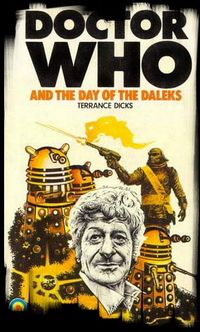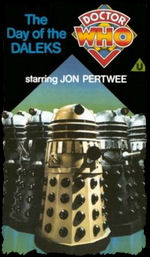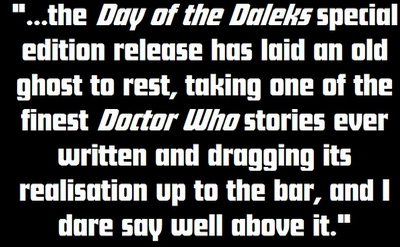|
| ||
|
STORY PLACEMENT THIS STORY TAKES PLACE BETWEEN THE BIG FINISH AUDIO BOOK "THE MAGICIAN'S OATH" AND THE TV STORY "THE CURSE OF PELADON."
PRODUCTION CODE KKK
WRITTEN BY LOUIS MARKS
DIRECTED BY PAUL BERNARD
RATINGS 9.6 MILLION
WORKING TITLES THE GHOST HUNTERS & YEARS OF DOOM
RECOMMENDED PURCHASE 'DAY OF THE DALEKS' SPECIAL EDITION DVD (BBCDVD3043) RELEASED IN SEPTEMBER 2011.
BLURB ON EARTH IN THE 22ND CENTURY, DALEKS HAVE ENSLAVED THE PLANET AND HUMANS LIVE IN FEAR OF THEIR MASTER. MEANWHILE, BACK IN THE 20TH CENTURY, A PEACE CONFERENCE IS URGENTLY NEEDED TO PREVENT WORLD WAR THREE. WHEN REPORTS REACH UNIT OF A GHOST AT AUDERLY HOUSE - THE SITE FOR THE CONFERENCE - THE DOCTOR AND JO DECIDE TO INVESTIGATE. DANGER IS WAITING FOR THEM THERE, INCLUDING A TRIP TWO HUNDRED YEARS INTO THE FUTURE WITHOUT THE TARDIS... |
| |
|
|
| |
|
Day of the Daleks 1ST JANUARY 1972 - 22ND JANUARY 1972 (4 EPISODES)
Long before the days of the internet and at a time when even mail order was perceived as being perilous in the extreme, no matter how hard I tried I just couldn’t get hold of Day of the Daleks on video. It wasn’t until 1995 – some six or seven years after first reading the novelisation - that my parents were able to track down the recently released episodic version in time for my birthday. To those that have seen the original version of Day of the Daleks, it will probably come as no great surprise that I wasn’t desperately impressed with the four episodes.
A lot of my disenchantment was directly attributable to the serial’s
below-par production. Whilst director Paul Bernard did his best to mask
the fact that he had only three Dalek props available to him, regrettably
it was all too apparent that the Earth had been conquered by just a trio
of Skaro’s finest (the novelisation’s Black Dalek not amongst them, much
to my chagrin) whose siege of Auderly House in the final episode was
unreservedly feeble. Matters were compounded by a bleak 22nd century Earth
comprising of just an autumn field and some anachronistic - though
suitably grim - 1970s concrete architecture. Worse still, the Daleks’
voices were beyond the pall, sounding nothing like the Dalek voices heard
before or since, and often being bested by the unusually noisy clicks of
the Daleks’ dome lights. Save for those featured in the opening momen
For many years, these failings drove me barmy as, on paper, Day of the Daleks is one of the finest third Doctor / UNIT stories. Whilst it may be derived from The Outer Limits episode Soldier, Louis Marks’ thought-provoking plot is both clever and riveting. I still can’t believe that it took the production team almost a decade to tackle a good paradox story (note the use of the qualifying ‘good’ – I haven’t forgotten about The Space Museum). Not only does it entertain and even challenge the audience, but it also pre-empts a problem that would have reared its head upon establishing the Doctor as a wanderer in time and space with control over his destinations – if things go pear-shaped, why not just pop back in time and have another go? Marks’ script is predicated on this so-called ‘Blinovitch Limitation Effect’ making unwitting time travellers a part of events, often with devastating effects. Eat your heart out, Terminator 2.
“Don’t they like being happy and prosperous?”
The first of Day of the Daleks’ two DVDs contains the four episodes as they originally aired in 1972, warts and all, together with an optional commentary from actors Anna Barry and Jim Winston; producer Barry Letts; script editor Terrance Dicks; and vision mixer Mike Catherwood. The latter also joins his former producer for a twenty minute saunter around the director’s gallery in A View from the Gallery, while the thirty minute Blasting the Past blends interview clips of all those involved in the commentary with those of modern Who stalwarts Paul Cornell, Ben Aaronovitch and Nicholas Briggs to document both the making and reception of Day of the Daleks.
Above: The special edition’s devastating new special effects
As you would have thought given my comments above, I’m ecstatic about the special edition. It’s astonishing what a difference Briggs’ Dalek voices make – the whole pace of the thing feels so much faster - and the embellished siege of Auderly House now finally lives up to the novelisation’s epic portrayal of it. Admittedly, some the new special effects sit ill in a supposedly 70s adventure, but they are least in keeping with the stylistics of the period, if not the technical capabilities. I must also commend Broster’s decision to excise the actors’ fluffs – the female technician’s error at the end of Episode 1 was up there with many of Billy Hartnell’s most terrible, and compounded by its repeat in the lengthy reprise at the start of Episode 2. If I were to quibble, it would only be to lament the exclusion of an optional movie version and the continuing presence of UNIT’s CSO-yellow corridor outside the Doctor’s lab. It looks like it’s been painted by Del and Rodney.
Above: The special edition’s 22nd century - not a concrete monstrosity in sight
The bonus material accompanying the special edition again sees the
original outshone. The ‘making of’ featurette offers fascinating insight
into the painstaking processes involved in creating this DVD’s special
edition, including Mark Ayres’ laborious cutting of the original Dalek
voices from the original mono sound mix. But while this programme looks at
how this special
The long-awaited second chapter of The Unit Family follows next, picking up where Part 1 left off with Roger Delgado’s Master’s arrival in Terror of the Autons, and from there looking at each of the UNIT adventures right up to the break-up of the family at the end of the Pertwee era. Barely half an hour long, this programme feels much more hurried than its more meticulous foundational instalment, but it’s still thoroughly absorbing. The contributors’ comments about Delgado’s tragic death in Turkey are more candid than those that I’ve heard before, though fortunately the heaviness of such matters is offset by the amusing anecdotes of Benton actor John Levene, who claims to have almost beheaded half the cast of The Dæmons through his unauthorised fiddling with that story’s helicopter’s controls.
Above: The UNIT Dating Conundrum featurette
Having written a lengthy essay on the subject not that long ago, The Unit Dating Conundrum was a feature that really piqued my interest. Narrated by illustrious Who showman Toby Hadoke, this lighthearted nine-minute feature does a marvellous job of outlining the key points of the controversy and, even more interestingly, the clumsiness that gave rise to them. Those involved with the production of the UNIT stories are quick to applaud their “deliberate vagueness” and push paltry platitudes such as “history is what you can remember,” whilst those charged with picking up the pieces later, such as seventh Doctor scribe Ben Aaronovitch and Doctor Who Magazine writer Dave Owens, are just as swift to slam “idiotic production teams.” Fortunately Nicholas Briggs is on hand to offer us a more even-handed view, opining that the UNIT stories were meant to be set “the day after tomorrow,” not unlike the almost-contemporary stories of the Russell T Davies era (which went and dug themselves almost as big a hole as their UNIT predecessors…) All told The Unit Dating Conundrum is a fun little feature that highlights both the passion and the pedantry of Who fandom, while reminding us all that the real UNIT dating debacle wasn’t the apparently contrary temporal placement of the third and fourth Doctor’s Earthbound adventures, but why Mike Yates never got it on with Jo Grant.
For me, the Day of the Daleks special edition release has laid an
old ghost to rest, taking one of the finest Doctor Who stories ever
written and dragging its realisation up to the bar, and I dare say well
above it. Purists and completists will be appeased by the inclusion of the
four original episodes, and those like me who love to peek behind the veil
will be in their element with one of the most comprehensive collection of
documentaries and featurettes that we’ve seen since the release of The
Chase. Rarely do classic Who DVDs get any better than this.
|
||
|
Copyright © E.G. Wolverson 2008, 2012
E.G. Wolverson has asserted his right under the Copyright, Design and Patents Act 1988, to be identified as the author of this work. |
||
|
Unless otherwise stated, all images on this site are copyrighted to the BBC and are used solely for promotional purposes. ‘Doctor Who’ is copyright © by the BBC. No copyright infringement is intended. |
||

.jpg)
.jpg)
.jpg)

.jpg)
.jpg)
.jpg)
 Marks’
characterisation is similarly sublime, if marred a little by the “stage
performances” of certain members of the cast. Aubrey Woods’ Controller is
a case in point - an initially unlikeable quisling who gradually finds his
courage, albeit in an overstated way. The guerrillas are painted a similar
shade of grey, initially portrayed as murderous fanatics, only to steadily
morph into weathered freedom fighters as the narrative unfolds. The writer
takes the time to afford his regular characters a few illuminating moments
too - Captain Yates’ dressing down of Sergeant Benton so that he can steal
his scran and flirt with Jo stands out in particular, as does the Doctor’s
casual chomp into a sandwich as he fends off the advances of a guerrilla.
Unfortunately Marks’ bloodthirsty Doctor doesn’t have any qualms about
gunning down Ogrons looming large on the horizon, though from the DVD’s
bonus material I gather that this was more a directorial gaffe than a flaw
in the script.
Marks’
characterisation is similarly sublime, if marred a little by the “stage
performances” of certain members of the cast. Aubrey Woods’ Controller is
a case in point - an initially unlikeable quisling who gradually finds his
courage, albeit in an overstated way. The guerrillas are painted a similar
shade of grey, initially portrayed as murderous fanatics, only to steadily
morph into weathered freedom fighters as the narrative unfolds. The writer
takes the time to afford his regular characters a few illuminating moments
too - Captain Yates’ dressing down of Sergeant Benton so that he can steal
his scran and flirt with Jo stands out in particular, as does the Doctor’s
casual chomp into a sandwich as he fends off the advances of a guerrilla.
Unfortunately Marks’ bloodthirsty Doctor doesn’t have any qualms about
gunning down Ogrons looming large on the horizon, though from the DVD’s
bonus material I gather that this was more a directorial gaffe than a flaw
in the script..jpg)
 The second disc houses a long overdue special edition of the serial,
produced by Steve Broster, which seeks to redress many of the flaws that
I’ve described above. Mercifully, the Daleks’ voices have been completely
redone by Briggs, who used an analogue remodulator to create a
pitched-down sound that’s halfway between his new series / Big Finish
Daleks and those seen in classic Doctor Who. Perhaps even more
ambitiously though, Broster’s team revisited the original location to film
brand new shots for the final assault on Auderly House, turning what was
once a measly three-strong Dalek invasion force into a credible threat.
The special edition even goes a little beyond what many would argue was
necessary, using computer generated effects to replace the original’s
outmoded ones, thereby painting a much more convincing picture of the 22nd
century than Paul Bernard could ever have hoped to.
The second disc houses a long overdue special edition of the serial,
produced by Steve Broster, which seeks to redress many of the flaws that
I’ve described above. Mercifully, the Daleks’ voices have been completely
redone by Briggs, who used an analogue remodulator to create a
pitched-down sound that’s halfway between his new series / Big Finish
Daleks and those seen in classic Doctor Who. Perhaps even more
ambitiously though, Broster’s team revisited the original location to film
brand new shots for the final assault on Auderly House, turning what was
once a measly three-strong Dalek invasion force into a credible threat.
The special edition even goes a little beyond what many would argue was
necessary, using computer generated effects to replace the original’s
outmoded ones, thereby painting a much more convincing picture of the 22nd
century than Paul Bernard could ever have hoped to..jpg)
.jpg) edition came about, The Cheating Memory
explores why. Blown away by Day of the Daleks at the tender
age of six, Broster wouldn’t see its four episodes again until many years
later, when it didn’t – and, arguably, couldn’t hope to – live up to his
romanticised memories of it. This ten minute feature sees psychologist Dr
Sarita Robinson explain, in lay terms, how our memories can be embellished
or “blended” with others to create an unrealistic impression of what we’ve
seen.
edition came about, The Cheating Memory
explores why. Blown away by Day of the Daleks at the tender
age of six, Broster wouldn’t see its four episodes again until many years
later, when it didn’t – and, arguably, couldn’t hope to – live up to his
romanticised memories of it. This ten minute feature sees psychologist Dr
Sarita Robinson explain, in lay terms, how our memories can be embellished
or “blended” with others to create an unrealistic impression of what we’ve
seen. .jpg)